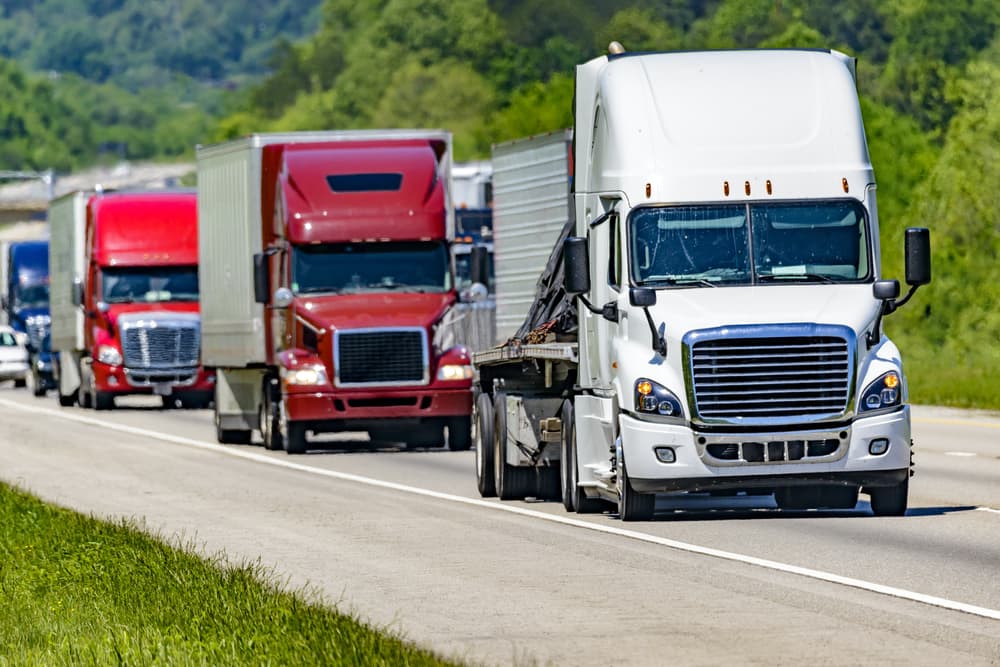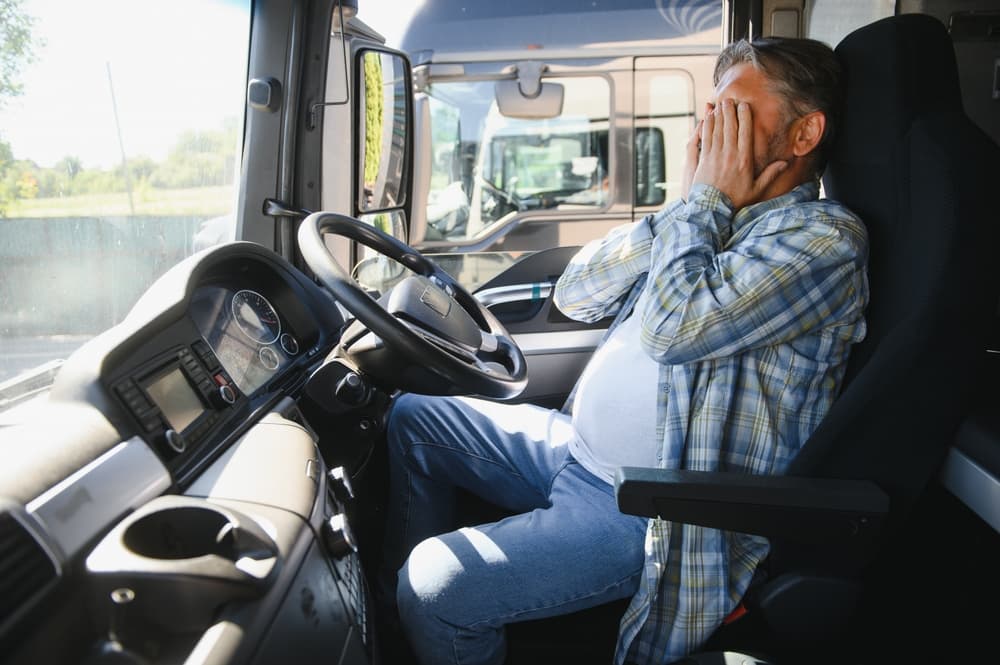When a large truck, such as a big rig or tractor-trailer, hits a smaller passenger vehicle, the smaller vehicle's occupants will usually suffer more severe injuries. Many truck accidents happen when truckers drive negligently and carelessly.
However, the trucking companies that employ these drivers may share the blame. Consequently, if you suffered injuries in a truck accident, you can file a personal injury claim or a lawsuit against the negligent truck driver and trucking company.
As soon as possible after your truck accident, retain an experienced truck accident attorney who can handle every stage of the claims filing process. First, your lawyer can review your truck accident with you and determine the identity of all potentially responsible parties.
Your lawyer can then gather important documents for your case and pursue a claim against all potentially responsible individuals or entities. If the insurance company does not offer you the fair monetary recovery you deserve for your injuries, your lawyer can pursue litigation in court.
Every step of the way, your lawyer can aggressively advocate for you and your legal interests. They can also represent you at all legal proceedings in your case, including your discovery deposition, civil jury trial, or binding arbitration hearing, and work to maximize the total monetary award you receive for your injuries.
Schedule a Free Initial Consultation Today!
Types of Accidents That Involve Large Trucks
When truck drivers and trucking companies behave negligently and recklessly, serious accidents may result.
Some of the most common truck accidents that occur because of negligence include:

- T-bone or broadside accidents, where the front of a large truck hits the side of the vehicle traveling on an intersecting roadway, usually because the truck driver fails to yield the right-of-way to the other driver at the appropriate time
- Jackknife accidents, where the tractor and trailer fold in on one another, resembling the form of a jackknife, and skid forward or downhill, usually because the truck driver takes a sharp curve too fast
- Rollover accidents, where the tractor trailer's center of gravity becomes offset usually due to improper loading, and the truck rolls over in the middle of the road, bringing about a series of collisions
- Tailgate or rear-end accidents, where the front of a large truck hits the back of another vehicle, usually because the truck driver is speeding
- Sideswipe accidents, where the side of a large truck strikes the side of a vehicle that is traveling in the same direction
- Head-on collisions, where the front of a truck hits the front of an oncoming vehicle, usually because the truck driver passes another vehicle in a no-passing zone or is under the influence of alcohol or drugs
Suppose you suffered physical injuries in any of these types of truck accidents. In that case, your truck accident lawyer can determine if you can file a personal injury claim against the responsible truck driver and/or their employer trucking company.
If so, your attorney can file a claim or lawsuit on time, safeguarding your ability to recover the monetary damages you deserve for your injuries.
When Are Truck Drivers Responsible for an Accident?
Truck drivers are responsible for an accident and the resulting injuries if they drive in an unreasonable, negligent, or careless manner under the circumstances. Negligent truck driving can take several forms, but it usually occurs when a driver violates one or more traffic laws or motor carrier regulations.
Common violations that may lead to a severe truck accident include a truck driver's failure to use turn signals, failure to use mirrors, excessive speeding, and Negligent truck driving the right-of-way to other vehicles at highway merge lanes or traffic intersections.
Truck accidents may also happen when drivers violate state or federal motor carrier regulations. The primary purpose of these regulations is to ensure that truck drivers and trucking companies follow proper cargo weight limits, that they properly load the cargo onto their vehicles, and that they maintain their vehicles in a safe condition, such as by properly inspecting them and ensuring that all lighting mechanisms are working correctly.
When a truck driver or trucking company violates one or more motor carrier regulations, the truck's center of gravity may become offset, leading to a rollover accident. At other times, loose cargo may slide off the truck and into the road, bringing about a series of collisions.
Next, some truck accidents are the result of truck driver road rage. Many truck drivers are in a hurry to arrive at their final destination and will resort to aggressive driving tactics to avoid slow-moving traffic.
For example, a truck driver might aggressively use their high beams, honk their horn, weave in and out of heavy traffic without using their turn signals, speed, and tailgate other vehicles. However, exhibiting these reckless driving maneuvers may inadvertently cause a severe accident, which leaves other drivers or passengers seriously injured.
Truck accidents may also happen when a driver becomes fatigued while on the road. To reap financial benefits, many truck drivers resort to operating their vehicles for hours on end without stopping to take breaks or sleep. As a result, they may lose their ability to concentrate while driving or fall completely asleep at the wheel, losing total control over their vehicle. As a result, a single accident or series of accidents may occur.
Another common cause of truck accidents is intoxicated driving. When truck drivers are intoxicated, it is very easy for them to experience limited vision, limited concentration, delayed reflexes, and delayed reaction time. Consequently, they may be unable to see an oncoming vehicle, or if they do see a vehicle approaching in the vicinity, they may be unable to hit their brakes in time to avoid a collision.
Finally, some truck accidents result from distracted or inattentive driving. A truck driver may become distracted when they listen to loud music in the cab of their vehicle, fiddle with a GPS navigation system, or send a text message on a cellular phone or tablet while driving. All these activities may turn the driver's eyes off the road, preventing them from seeing an oncoming vehicle and reacting appropriately.
You are not alone if you suffered injuries in a truck accident resulting from one or more of these types of driver negligence. Your truck accident attorney can determine if you can file a personal injury claim or lawsuit against the responsible truck driver or against a trucking company that employs the driver. If so, your attorney can take over the claims-filing process and secure the total monetary damages you need for your accident-related losses.
How Can You Hold a Trucking Company Liable After a Crash?
In addition to negligent truck drivers, employer trucking companies may share some or all of the blame for a truck crash. This is because, in many situations, trucking companies are vicariously responsible for the negligent actions and inactions of their employee drivers.
Additionally, trucking companies are responsible for hiring and retaining only experienced, capable drivers. They may be liable for negligent entrustment if they hire or retain a truck driver with a record of moving violations.
Similarly, trucking companies have a duty to properly supervise their drivers and ensure that they comply with all continuing education requirements and other certifications. If they fail to supervise a driver properly, and that driver negligently causes an accident, the trucking company may be partially responsible.
In many situations, truck drivers and trucking companies have the same insurer. Therefore, your attorney can file a claim with the appropriate insurance company on your behalf and begin pursuing a fair settlement offer that truly compensates you for your injuries.
Successfully Proving a Truck Accident Case
To recover monetary compensation and damages in a truck accident case, the accident victim, not the responsible truck driver or trucking company, must satisfy a legal burden of proof. The at-fault party or parties do not have to prove anything in the case. Rather, the entire legal burden rests with the injured accident victim.
Truck drivers and trucking companies have a duty to exercise reasonable care at all times. If they fail to do so, however, they may be liable for any accidents and injuries to others.
To successfully prove a truck accident claim or lawsuit, the injured accident victim must establish that the truck driver and/or the trucking company violated their legal duty of care. Truck drivers typically violate their legal duty when they break one or more traffic laws or motor carrier regulations.
Similarly, trucking companies usually deviate from the standard of care when they fail to hire or retain capable drivers or when they fail to supervise their drivers reasonably.
Next, the injured victim must show that their truck accident occurred directly due to the at-fault party's negligence. Finally, they must demonstrate that they suffered one or more physical injuries from their truck accident.
To establish medical causation in your truck accident case, your attorney can retain a qualified medical expert who can physically examine you and establish that your injury or injuries directly resulted from the subject accident. Based upon a reasonable degree of medical probability, a medical expert can also establish that you suffered one or more permanent injuries due to your truck accident.
Your attorney can satisfy your legal burden of proof, making you eligible to recover monetary damages for your accident-related injuries.
Recoverable Monetary Damages for Truck Accidents
In a personal injury claim or lawsuit that a truck accident victim files against a negligent truck driver or their employer trucking company, the accident victim can recover various types of monetary compensation in the form of damages.
Those damages may compensate the accident victim for economic losses and intangible losses.
- Examples of economic damages in a truck accident claim include monetary compensation for past and anticipated medical costs, lost earnings, and loss of earning capacity.
- Examples of non-economic damages include monetary compensation for all of the following: mental anguish and distress, loss of spousal consortium, past and future pain and suffering, inconvenience, loss of use of one or more body parts, lost quality of life, long-term care expenses, permanent disfigurement or disability, and humiliation from visible injuries, such as scarring.
Your attorney can determine which of these monetary damages you can recover against the negligent truck driver or trucking company in your case. Your attorney will do everything possible to maximize your total settlement compensation. For example, your lawyer can aggressively negotiate with insurance company representatives and threaten them with litigation if they do not increase their settlement offer appropriately.
If your attorney must litigate your truck accident claim in the court system they can represent you at all legal proceedings, enter testimony on your behalf, call experts and other witnesses to testify, and pursue the maximum monetary damages available to you.
Speak with a Truck Accident Attorney in Your Area Today
Accident victims who plan to file a lawsuit against a negligent truck driver or trucking
companies have limited time to do so. Specifically, truck accident victims must file their personal injury lawsuit within two years of their accident date. Otherwise, they automatically waive their right to pursue and recover the monetary damages they deserve for their injuries. Given this short window of time, you need to consult a skilled truck accident lawyer in your area as quickly as possible.
A truck accident attorney can gather important documents for your case, file a claim with a negligent truck driver or trucking company's insurer, and negotiate fair settlement compensation for your injuries. If you need to sue, your attorney can file a lawsuit on your behalf, represent you at legal proceedings in your case, and achieve the best possible settlement or litigation result.
Truck accident claims require you to move quickly, so your lawyer can preserve important evidence the trucking company might have regarding liability. Seek a free consultation with a personal injury attorney right away.



